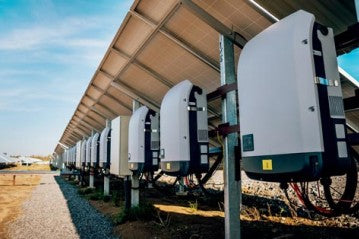
As the cost of solar panels continues to decrease, more and more households are switching to solar energy. However, choosing the right battery for your solar inverter can be a daunting task. In this blog post, we’ll discuss the factors to consider when choosing a battery for a solar inverter, and how to find the right battery for your solar power system.
1. Determine Your Energy Needs
The first step in choosing a battery for your solar inverter is to determine your energy needs. You’ll need to know how much energy your household consumes on a daily basis, as well as how much energy your solar panels can generate. This will help you determine the size of the battery you need.
It’s important to note that batteries are rated in terms of their capacity, which is measured in kilowatt-hours (kWh). A 10 kWh battery, for example, can store 10 kilowatt-hours of energy. You’ll need to choose a battery with a capacity that is suitable for your household’s energy needs.
2. Consider the Battery Chemistry
There are several types of batteries that can be used in a solar power system, each with its own advantages and disadvantages. The most common types of batteries used in solar power systems are lead-acid batteries and lithium-ion batteries.
Lead-acid batteries are the oldest type of rechargeable battery and have been used in solar power systems for many years. They are relatively inexpensive and have a long lifespan, but they are heavy and require regular maintenance.
Lithium-ion batteries are a newer type of rechargeable battery that have become increasingly popular in recent years. They are more expensive than lead-acid batteries but have a longer lifespan and require less maintenance. They are also lighter and more compact than lead-acid batteries, making them a popular choice for solar power systems.
3. Evaluate the Battery’s Performance
When choosing a battery for your solar inverter, it’s important to evaluate the battery’s performance. This includes the battery’s efficiency, charge and discharge rates, and lifespan.
Battery efficiency refers to how much energy is lost during the charging and discharging process. The more efficient the battery, the less energy is lost, which means more energy is available for use in your household.
The charge and discharge rates refer to how quickly the battery can charge and discharge. This is important because it determines how quickly the battery can be used and how quickly it can be recharged.
Finally, the battery’s lifespan is an important consideration. Batteries degrade over time, which means they will eventually need to be replaced. You’ll want to choose a battery with a long lifespan to minimize the frequency of replacements.
Conclusion
Choosing the right battery for your solar inverter is an important decision that can have a significant impact on the performance and efficiency of your solar power system. By determining your energy needs, considering the battery chemistry, and evaluating the battery’s performance, you can find the right battery for your solar power system.

0 comments